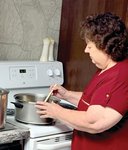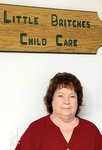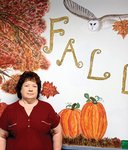"You know my best moment?" grinned Thelma Brown. She was recalling the feeling of taking the last dirty diaper can out to the dumpster. Still, the mist in her eyes reflected the good memories she was …
This item is available in full to subscribers.
We have recently launched a new and improved website. To continue reading, you will need to either log into your subscriber account, or purchase a new subscription.
If you are a current print subscriber, you can set up a free website account by clicking here.
Otherwise, click here to view your options for subscribing.
Please log in to continue |
|





"You know my best moment?" grinned Thelma Brown. She was recalling the feeling of taking the last dirty diaper can out to the dumpster. Still, the mist in her eyes reflected the good memories she was leaving behind as she looked back.
Brown has retired after 43 years in the business and has closed the doors of Little Britches Childcare in Linn. Her next project is to go back through her files and count the contracts. She knows she kept hundreds of children but is now curious how many hundreds that is.
Back in the '70s, her husband, Mike, now retired from the Missouri Department of Corrections, and Thelma lived in Jefferson City. She worked then as a data entry specialist for the Missouri Department of Revenue. Two children joined their family. Son Donnie was born in 1976 and daughter Nikki came along in 1977. The couple got serious about planning the future of their household and they discovered some basic dissatisfaction with their situation. If Thelma was to continue with the state, they were going to need childcare for their children. Nor were they having any luck locating any with whom they were pleased. Plus, they knew school days would be approaching soon. Without batting an eye, at least not very often, they took on changes of location and Thelma's career at the same time.
Moving to Linn kept Mike within easy commuting distance of his work and it put the family into a smaller school district. It was possible for them to find a rural setting for their home. The place was still close enough to Linn for Thelma to start a childcare business of her own. They both smiled about what it took to be accepted as newcomers in a small town.
"It wasn't easy to feel like we were right away," said Mike.
However, Thelma came upon a trump card. She was willing to keep infants less than two years old. "It's so hard for parents to find childcare for babies," she said.
Licensing doesn't allow for more than four in a facility the size of Little Britches. Larger centers can, and do, take more. Many don't. There was, and is a shortage. Therefore, her business got a slam-dunk start because she was willing to take it on.
"It grew simply by word of mouth," she said.
Listing in the yellow pages, and, in the last few years, a simple online presence, kept her plenty busy.
She also did some pre-kindergarten teaching. There was never any thought of offering a service of less than the highest quality. She received comments from the schools, public and parochial. They said her students seemed to start elementary classes ahead of others.
In 1980, she went through licensing to expand to 10 children. In 2001, she became licensed for 20. That required some college credits. It also led her to hire two employees to assist. Since then, she has operated at full capacity with few exceptions.
Through the years, the licensing requirements have become more difficult. The rules seem to be changing at an accelerating rate.
"I think they're trying to push us out," she said. "The rules are starting to get ridiculous."
The need for childcare seems to be increasing so it's hard to understand why policies reduce the number of willing professionals. That paradox exists at every level of education these days. Making it hard to get into the business is counterproductive but wearing out the proven ones who are already there seems especially destructive, Thelma noted.
The COVID-19 crisis cut into her attendance this year pretty well, but she never had fewer than eight. Little Britches never had any recorded exposures. She was conscientious about daily disinfecting; however, she was only trying to do better what she always did well. As things opened up, her census improved to 18, but six of those graduated into school in August. Suddenly, it seemed like the time. She's very comfortable with the decision but will miss the kids and her employees. She contemplates substitute-teaching but hasn't yet decided. She will still be watching six kids after school on Mondays but the 11-hour days, all week, are over. One of her alumni bought her equipment and plans to open a similar business in Westphalia, Taos, or Linn. That should happen next spring or summer.
She's grateful to recount conducting her entire career without a major disaster. There were, however, some anxious moments. Once, an ambulance took an infant to the hospital for a "something-swallowed" event. Somehow, the child managed to ingest a Tupperware holder mounting screw. At the emergency room, the object could not be found. The doctor told her scratches on the esophagus came from her fingernails. He said she was scraping for an object which was never there, and she didn't care to hear that. Later, Brown's daughter Nikki found the screw. It was along the path the paramedics would have taken to trundle the child to the ambulance. Naturally, the baby got rid of what all the adults in the case couldn't find.
There were also a couple of broken collarbones along the way. One was caused by a dizzy dismount from a Sit-n-Spin. The other was a collision with a backyard tree. Despite the horror of any of these moments, everybody's grinning about them now.
Though Thelma hasn't counted them yet, some of her alumni have a special spot in her memories. Five have returned to work for her. Three are second-generation Little Britches students. One has gone on to become a doctor. Many stop by to say hello when they're in town. She recalled a recent chance meeting at McDonald's. An adult male seemed to be looking at her, but she didn't recognize him. Finally, he walked over and said, "You don't know who I am, do you?"
She admitted she didn't, but he turned out to be an alumnus who left town and was coming through for the first time in years. It's easier for those to recognize their former teachers than the other way around.
Her husband has shared in her labor with empathy. "She has worked hard," he said. "She has done her part for the family."
Thelma is pleased with her career. He's pleased with what she's done, and how she's done it. They're both pleased to look forward to much less stress in retirement but they'll both miss the people who contributed to and helped navigate, that stress. It seems to be a win-win situation. They're glad to have been there, and they're glad to leave.